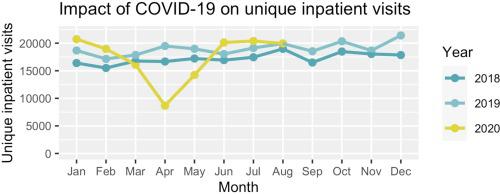Journal of Biomedical informatics ( IF 4.0 ) Pub Date : 2020-12-10 , DOI: 10.1016/j.jbi.2020.103657 Neil S Zheng 1 , Jeremy L Warner 2 , Travis J Osterman 2 , Quinn S Wells 3 , Xiao-Ou Shu 4 , Stephen A Deppen 5 , Seth J Karp 6 , Shon Dwyer 7 , QiPing Feng 8 , Nancy J Cox 9 , Josh F Peterson 10 , C Michael Stein 11 , Dan M Roden 12 , Kevin B Johnson 13 , Wei-Qi Wei 1

|
Objective
During the COVID-19 pandemic, health systems postponed non-essential medical procedures to accommodate surge of critically-ill patients. The long-term consequences of delaying procedures in response to COVID-19 remains unknown. We developed a high-throughput approach to understand the impact of delaying procedures on patient health outcomes using electronic health record (EHR) data.
Materials and Methods
We used EHR data from Vanderbilt University Medical Center’s (VUMC) Research and Synthetic Derivatives. Elective procedures and non-urgent visits were suspended at VUMC between March 18, 2020 and April 24, 2020. Surgical procedure data from this period were compared to a similar timeframe in 2019. Potential adverse impact of delay in cardiovascular and cancer-related procedures was evaluated using EHR data collected from January 1, 1993 to March 17, 2020. For surgical procedure delay, outcomes included length of hospitalization (days), mortality during hospitalization, and readmission within six months. For screening procedure delay, outcomes included 5-year survival and cancer stage at diagnosis.
Results
We identified 416 surgical procedures that were negatively impacted during the COVID-19 pandemic compared to the same timeframe in 2019. Using retrospective data, we found 27 significant associations between procedure delay and adverse patient outcomes. Clinician review indicated that 88.9% of the significant associations were plausible and potentially clinically significant. Analytic pipelines for this study are available online.
Conclusion
Our approach enables health systems to identify medical procedures affected by the COVID-19 pandemic and evaluate the effect of delay, enabling them to communicate effectively with patients and prioritize rescheduling to minimize adverse patient outcomes.
中文翻译:

一种回顾性方法,用于评估在 COVID-19 背景下与心血管和癌症相关诊断程序延迟相关的潜在不良后果
客观的
在 COVID-19 大流行期间,卫生系统推迟了非必要的医疗程序,以容纳激增的重症患者。延迟应对 COVID-19 程序的长期后果仍未知。我们开发了一种高通量方法,利用电子健康记录 (EHR) 数据了解延迟手术对患者健康结果的影响。
材料和方法
我们使用来自范德比尔特大学医学中心 (VUMC) 研究和合成衍生物的 EHR 数据。 2020 年 3 月 18 日至 2020 年 4 月 24 日期间,VUMC 暂停了择期手术和非紧急就诊。将这一时期的手术程序数据与 2019 年类似时间范围进行了比较。心血管和癌症相关手术延迟的潜在不利影响是使用 1993 年 1 月 1 日至 2020 年 3 月 17 日收集的 EHR 数据进行评估。对于手术程序延迟,结果包括住院时间(天数)、住院期间的死亡率以及六个月内的再入院。对于筛查程序延迟,结果包括 5 年生存率和诊断时的癌症分期。
结果
与 2019 年同期相比,我们确定了 416 项外科手术在 COVID-19 大流行期间受到了负面影响。利用回顾性数据,我们发现手术延迟与患者不良结果之间存在 27 个显着关联。临床医生审查表明,88.9% 的显着关联是合理的且具有潜在的临床意义。本研究的分析流程可在线获取。
结论
我们的方法使卫生系统能够识别受 COVID-19 大流行影响的医疗程序并评估延误的影响,使他们能够与患者进行有效沟通并优先考虑重新安排时间,以尽量减少患者的不良后果。











































 京公网安备 11010802027423号
京公网安备 11010802027423号